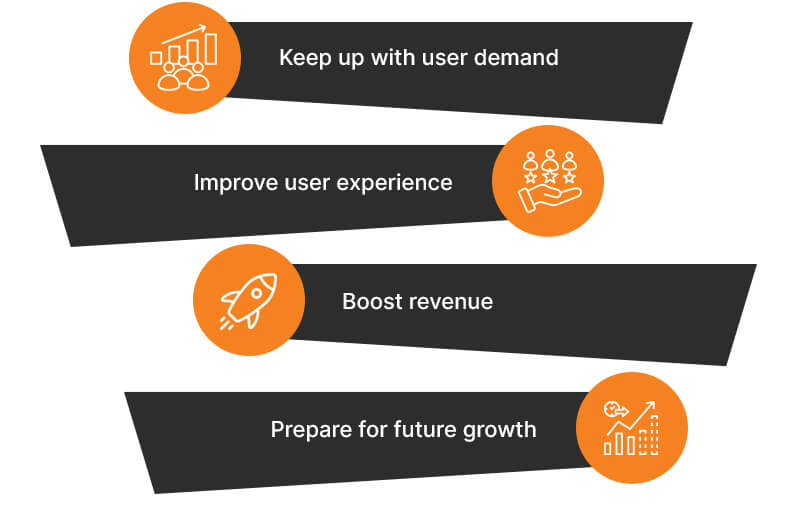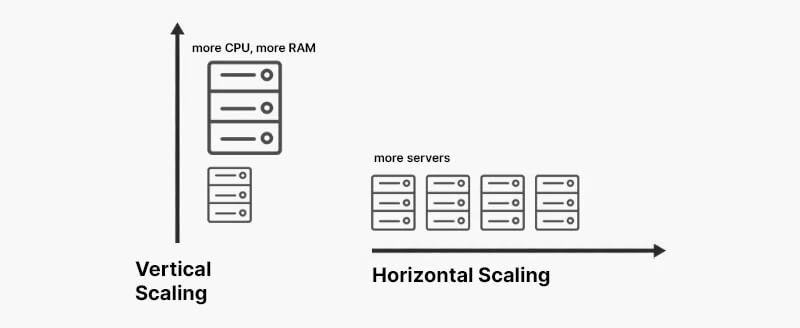Welcome to the exciting and fast-paced world of web applications! As more and more businesses are moving online, the need for high-performance web apps is greater than ever. But, with so much competition out there, how can you make sure your web app stands out from the crowd? The answer is simple – by optimizing your web app’s performance!
At Netsmartz, we know that even the most negligible performance improvements can have a massive impact on the success of a web app. So in this blog post, we’ll be sharing our top tips and tricks for scaling up your web app’s performance, helping you to deliver a lightning-fast user experience that will keep your customers coming back for more.
So, get ready to dive deep into the world of web app performance scaling!
What is Web Application Scalability?
Web application scalability refers to a web application’s ability to handle increased traffic and usage without sacrificing performance. In other words, a scalable web application should be able to adapt to increasing user demands and maintain fast load times, responsiveness, and reliability even when faced with high traffic or usage spikes.
By ensuring your application can handle increased traffic and usage, you can deliver a seamless user experience that keeps your customers engaged, drives sales, and helps your business grow over time.
Learn more about Understanding Web App Vs. Website to Find the Right Fit for Your Organization.
Reasons Behind Scaling a Web Application
With great success comes great responsibility. As your user base grows, you need to ensure that your web app can handle the increased traffic and usage that comes with it. This is where scaling up your web app becomes crucial. These issues can be more than just a nuisance – they can directly impact your bottom line. That’s why scaling up your web app is crucial for your business’s success.

1. Keep up with user demand
As your web application gains popularity, you’ll see increased user traffic. If your app isn’t scalable, this can quickly overwhelm your servers and cause your app to slow down or crash altogether. By scaling up your app, you can ensure it can handle increasing user demand without sacrificing performance.
2. Improve user experience
Slow load times, errors, and other performance issues can drive users away from your app and toward your competitors. By scaling up your web app, you can deliver a fast, seamless user experience that keeps your users engaged and coming back for more.
3. Boost revenue
A high-performing web app can directly impact your revenue by driving more traffic to your site, increasing user engagement, and boosting conversions. By scaling up your app, you can improve its performance and, in turn, increase your revenue.
4. Prepare for future growth
If you plan to expand your scaleup software development services or launch new products, scaling up your web app now can save you time and money in the long run. By ensuring that your app can handle increased traffic and usage, you’ll be ready to accommodate new customers and growth opportunities as they arise.
How to Scale a Web Application
Many factors affect web application scalability, so optimizing the app’s elements is essential. For better performance, it’s good to use available tools that help optimize the code and prepare the configuration to avoid unpleasant surprises. Here are the basic things you should implement when building a web application.
1. Utilize Cloud Computing

Cloud computing is a powerful tool for scaling up your web app and is increasingly becoming the go-to option for web app development companies of all sizes. Cloud computing services like AWS, Azure, and Google Cloud provide a flexible and cost-effective way to add computing power, storage, and bandwidth to your web app as needed without worrying about managing physical servers. With cloud computing, you can scale up or down quickly and easily in response to changing user demand or business needs.
2. Optimize your Database
Your database is at the heart of your web application, and optimizing it can significantly impact your app’s performance and scalability. One way to optimize your database is to use sharding, which involves splitting your database into smaller, more manageable pieces and distributing those pieces across multiple servers.
This can help improve response times and reduce latency, particularly for large and complex databases. Another optimization technique is indexing, which involves creating indexes on frequently accessed data to speed up queries. Caching data can also reduce the number of requests that need to be made to your database, improving response times and reducing server load.
3. Configure your Cache
Caching is a technique for storing frequently accessed data in memory or on disk so that it can be accessed more quickly than if it had to be fetched from a remote server. By configuring your cache effectively, you can reduce the number of requests that need to be made to your server and speed up response times.
One way to configure your cache is to use a distributed cache, which can store data across multiple servers, improving availability and performance. Another approach is to use edge caching, which involves caching content at the edge of your network, closer to your users.
4. Implement Clean Code
The quality of your code can significantly impact your web app’s performance and scalability. Writing clean, well-organized code can help improve response times, reduce server load, and make adding new features or functionality to your app more manageable. To write clean code, use best practices like commenting on your code, writing reusable functions, minimizing dependencies, and avoiding unnecessary complexity.
5. Use a Content Delivery Network (CDN)
A CDN is a network of servers located worldwide, which can help distribute your web app’s content to users more quickly and efficiently. Using a CDN can reduce the distance between your users and your servers, improving load times and reducing latency. CDNs can also help protect against DDoS attacks and other security threats by spreading traffic across multiple servers and locations. To use a CDN, you’ll typically need to configure your web app to route requests through the CDN’s servers and ensure that your content is cached correctly and distributed.
Wrapping Up
Scaling up your enterprise web app can be daunting, but it’s necessary if you want to keep up with user demand and maintain a competitive edge in today’s digital landscape. Optimizing your web app for scalability ensures it performs well under high user loads, is resilient to crashes and downtime, and can accommodate growing data volumes and new features over time.
At Netsmartz, we understand the challenges of scaling up web apps, and we’ve helped countless enterprises with our web app development services to achieve their scalability goals. So whether you’re looking to optimize your database, configure your cache, or leverage the power of cloud computing, our team of experienced developers can help you implement the right strategies to take your web app to the next level.
So don’t let scalability concerns hold you back. Get in touch with Netsmartz today to learn how we can help you optimize your enterprise web app for success.
Summary
Kickstart Your Project With Us!
Popular Posts
CONTACT US
Let's Build Your Agile Team.
Experience Netsmartz for 40 hours - No Cost, No Obligation.
Connect With Us Today!
Please fill out the form or send us an email to







